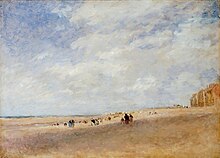The Birmingham School was a group of landscape artists working in Birmingham, England in the late 18th and early 19th centuries; descending from Daniel Bond, who was active in the 1760s, and including well-known later figures such as Thomas Creswick, Thomas Baker and David Cox,[1] who was to become an early precursor of impressionism.[2]

Although the artists of the school were not formally organised, they were related by their common technique, which distinguished them from the broader field of contemporary landscapists.[1] In particular the Birmingham School is notable for its emphasis on character as well as precision in its portrayal of nature; for example often depicting trees in a manner that has more in common with portraiture, and showing "a quest for the essential, the quiddity of what is observed".[3] Many of the artists were also related by training: Bond taught in the 1760s and pupils of his exhibited at the Free Society of Artists in London in 1763;[4] Joseph Barber opened a drawing academy in 1801 where pupils included Cox and Baker; and Samuel Lines opened another academy in 1806 where pupils included Creswick.[5]
Members
edit- Daniel Bond (1725–1803)
- Joseph Barber (1758–1811)
- Samuel Lines (1778–1863)
- Charles Barber (1783–1854)
- David Cox (1783–1859)
- W. Roberts (1788–1867)
- Joseph Vincent Barber (1788–1838)
- H. C. Allport (fl. 1811–23)
- Henry Harris Lines (1801–1889)
- Samuel Rostill Lines (1804–1833)
- F. H. Henshaw (1807–1891)
- Thomas Baker (1809–1864)
- Thomas Creswick (1811–1869)
- George Wallis (1811–1891)
- C. T. Burt (1823–902)
- Harry John Johnson (1826–1884)
- Elijah Walton(1832–1880)
See also
editReferences
edit- ^ a b c Grant, Maurice Harold (1958), "The Birmingham School of Landscape", A chronological history of the old English landscape painters, in oil, from the 16th century to the 19th century, vol. 2, Leigh-on-Sea: F. Lewis, p. 167, OCLC 499875203
- ^ Pillement, Georges (1978), "The Precursors of Impressionism", in Sérullaz, Maurice (ed.), Phaidon Encyclopedia of Impressionism, Oxford: Phaidon, p. 39, ISBN 978-0-7148-1897-9
- ^ Wildman, Stephen (1990), The Birmingham school: paintings, drawings and prints by Birmingham artists from the permanent collection, Birmingham: Birmingham Museums & Art Gallery, p. 6, ISBN 978-0-7093-0171-4
- ^ Grindle, Nicholas (2004), "Bond, Daniel (bap. 1725, d. 1803), painter and japanner", Oxford Dictionary of National Biography (Online ed.), Oxford University Press, retrieved 14 January 2012
- ^ Hartnell, Roy (1996), Pre-Raphaelite Birmingham, Studley: Brewin Books, p. 10, ISBN 978-1-85858-064-7